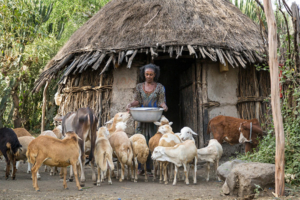This success story outlines how community workers like Yeshimebet Geta, an animal health worker in Ethiopia, play a crucial role in safeguarding public health. Yeshimebet, alongside Adanech, a health extension worker, received specialized training in risk communication organized by Breakthrough ACTION. With zoonotic diseases like anthrax endemic in their area due to the consumption of meat from sick animals, Yeshimebet and Adanech recognized the urgency of their mission. After the training, they conducted orientations for various community stakeholders, educating them on zoonotic disease prevention and control strategies. Through collaborative efforts, they facilitated discussions to address root causes hindering behavior change, such as poverty and access to healthcare services. Their efforts culminated in community decisions to avoid consuming meat from dead or sick animals, leading to a significant reduction in anthrax cases. When a village reported an anthrax case, Yeshimebet and Adanech swiftly responded, coordinating with local authorities to contain the outbreak and prevent further spread. Their effective implementation of the One Health approach saved countless lives, underscoring the importance of local empowerment and multisectoral collaboration in public health interventions. Yeshimebet’s reflection on the impact highlights the significance of community-driven solutions and the transformative potential of the One Health framework in promoting holistic health outcomes.
Community Workers in Ethiopia Save Lives Thanks to Risk Communication Training
You are here: Home1 / Resource Library2 / Community Workers in Ethiopia Save Lives Thanks to Risk Communication ...
This website was originally developed by Breakthrough ACTION (USAID Cooperative Agreement #AID-OAA-A-17-00017) under the leadership of Johns Hopkins Center for Communication Programs. This website is now maintained by Johns Hopkins Center for Communication Programs and its contents are the sole responsibility of CCP. The contents of this website do not necessarily reflect the views of USAID, the United States Government, or Johns Hopkins University.
© Johns Hopkins University. All rights reserved.


